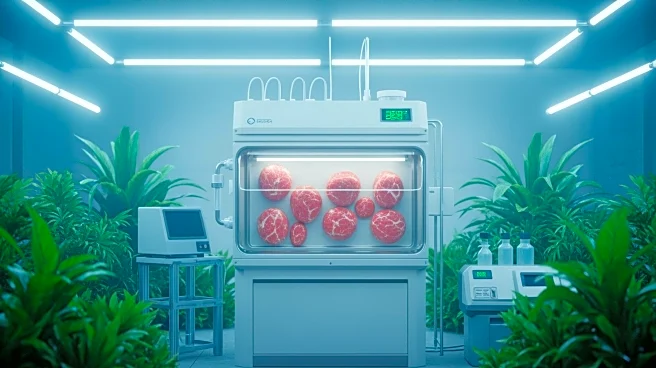What's Happening?
Cultured meat, also known as lab-grown or cell-based meat, is produced by growing animal cells in a laboratory setting rather than through traditional animal agriculture. This innovative approach aims
to address environmental concerns associated with conventional meat production, such as greenhouse gas emissions, land use, and water consumption. Cultured meat offers potential benefits, including significantly lower emissions, reduced land and water usage, and improved animal welfare by eliminating the need for widespread animal slaughter. The technology involves isolating animal cells, nurturing them in a controlled environment, and forming muscle tissue that resembles traditional meat. Despite its promise, the industry faces challenges related to market demand, ethical concerns, and regulatory hurdles.
Why It's Important?
Cultured meat presents a sustainable alternative to traditional meat production, potentially transforming the food industry by reducing environmental impact and addressing ethical concerns. With global meat consumption expected to rise significantly, cultured meat could play a crucial role in meeting demand without exacerbating environmental issues. The technology also offers a solution to animal welfare concerns, as it eliminates the need for raising and slaughtering animals. As the industry grows, it could create new economic opportunities and drive innovation in food production, while also challenging existing meat producers to adapt to changing consumer preferences.
What's Next?
The cultured meat industry is poised for growth, with market forecasts predicting significant expansion. Companies are seeking funding from venture capital, government grants, and crowdfunding to advance their technologies and scale production. Regulatory approval remains a key hurdle, with agencies like the FDA and USDA involved in ensuring safety standards. As consumer awareness and acceptance increase, the industry may see wider adoption, potentially leading to lower production costs and increased availability in grocery stores. Collaboration between stakeholders, including researchers, companies, and policymakers, will be essential to overcoming challenges and realizing the full potential of cultured meat.
Beyond the Headlines
Cultured meat raises ethical questions about the use of animal cells and the potential impact on traditional farming communities. The industry must navigate these concerns while promoting the benefits of reduced animal suffering and environmental impact. Additionally, the technology's reliance on laboratory settings and specialized equipment poses challenges for scalability and cost reduction. As the industry evolves, it may influence broader cultural shifts in food consumption and production, encouraging more sustainable practices and reshaping societal attitudes towards meat.











